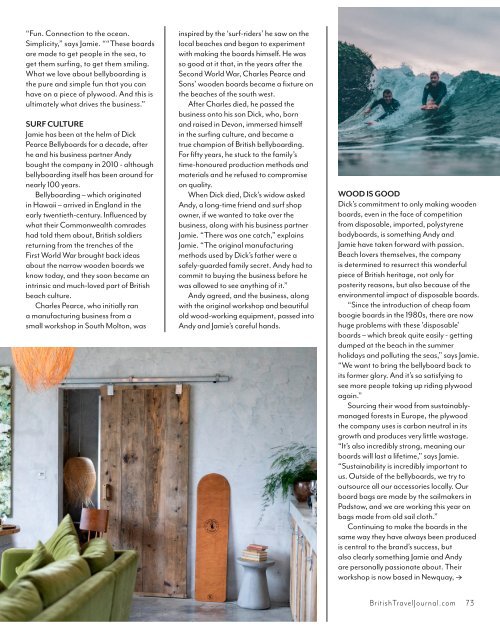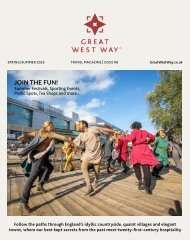British Travel Journal | Summer 2020
As we went to print with our last issue never could we have imagined a world in which travel would be completely stopped in its tracks. Never again will we take for granted our freedom to visit our magnificent cityscapes, captivating coastlines and peaceful countryside. It has been a difficult year for the hospitality and travel sector, but as this issue of British Travel Journal shows many are beginning to reopen, delighted to welcome back visitors and guests once more. We speak to these resilient hoteliers, destination managers, and others in the UK tourism industry about how they have responded to COVID-19. Our Cultural Agenda takes on a new direction, exchanging theatre performances for outdoor art, sculptures and natural wonders. And, in a time when remote locations are being sought after, all you need to know about wild (and nearly wild) camping is covered in our Sustainable Travel series. If camping isn’t for you, help is at hand to find the perfect holiday home in our 10 of the Best Self-Catering Properties. If you’re dreaming of strolls along the shore, fresh sea air and gently lapping waves, then you will love our coastal specials; Revival of the Beach Hut, England’s Coast, Wild Swimming and Secret Islands. Enjoy a taste of Cornwall in our Interview with Rick Stein before heading to the beach workshop of wooden bellyboards in our Meet the Maker: Wave Rider article with Dick Pearce. Finally, thank you to all our subscribers for your support, keeping our spirits high with words of encouragement and understanding the unusual delay in receiving this issue. Together we continued to dream of the extraordinary places we can explore, staying inspired with online and digital features, and hopefully by the time of reading this issue our next great adventures will have become reality.Travel safely, and together we will continue to support our wonderful tourism industry.
As we went to print with our last issue never could we have imagined a world in which travel would be completely stopped in its tracks. Never again will we take for granted our freedom to visit our magnificent cityscapes, captivating coastlines and peaceful countryside. It has been a difficult year for the hospitality and travel sector, but as this issue of British Travel Journal shows many are beginning to reopen, delighted to welcome back visitors and guests once more. We speak to these resilient hoteliers, destination managers, and others in the UK tourism industry about how they have responded to COVID-19. Our Cultural Agenda takes on a new direction, exchanging theatre performances for outdoor art, sculptures and natural wonders. And, in a time when remote locations are being sought after, all you need to know about wild (and nearly wild) camping is covered in our Sustainable Travel series. If camping isn’t for you, help is at hand to find the perfect holiday home in our 10 of the Best Self-Catering Properties. If you’re dreaming of strolls along the shore, fresh sea air and gently lapping waves, then you will love our coastal specials; Revival of the Beach Hut, England’s Coast, Wild Swimming and Secret Islands. Enjoy a taste of Cornwall in our Interview with Rick Stein before heading to the beach workshop of wooden bellyboards in our Meet the Maker: Wave Rider article with Dick Pearce. Finally, thank you to all our subscribers for your support, keeping our spirits high with words of encouragement and understanding the unusual delay in receiving this issue. Together we continued to dream of the extraordinary places we can explore, staying inspired with online and digital features, and hopefully by the time of reading this issue our next great adventures will have become reality.Travel safely, and together we will continue to support our wonderful tourism industry.
Create successful ePaper yourself
Turn your PDF publications into a flip-book with our unique Google optimized e-Paper software.
“Fun. Connection to the ocean.<br />
Simplicity,” says Jamie. ““These boards<br />
are made to get people in the sea, to<br />
get them surfing, to get them smiling.<br />
What we love about bellyboarding is<br />
the pure and simple fun that you can<br />
have on a piece of plywood. And this is<br />
ultimately what drives the business.”<br />
SURF CULTURE<br />
Jamie has been at the helm of Dick<br />
Pearce Bellyboards for a decade, after<br />
he and his business partner Andy<br />
bought the company in 2010 - although<br />
bellyboarding itself has been around for<br />
nearly 100 years.<br />
Bellyboarding – which originated<br />
in Hawaii – arrived in England in the<br />
early twentieth-century. Influenced by<br />
what their Commonwealth comrades<br />
had told them about, <strong>British</strong> soldiers<br />
returning from the trenches of the<br />
First World War brought back ideas<br />
about the narrow wooden boards we<br />
know today, and they soon became an<br />
intrinsic and much-loved part of <strong>British</strong><br />
beach culture.<br />
Charles Pearce, who initially ran<br />
a manufacturing business from a<br />
small workshop in South Molton, was<br />
inspired by the ‘surf-riders’ he saw on the<br />
local beaches and began to experiment<br />
with making the boards himself. He was<br />
so good at it that, in the years after the<br />
Second World War, Charles Pearce and<br />
Sons’ wooden boards became a fixture on<br />
the beaches of the south west.<br />
After Charles died, he passed the<br />
business onto his son Dick, who, born<br />
and raised in Devon, immersed himself<br />
in the surfing culture, and became a<br />
true champion of <strong>British</strong> bellyboarding.<br />
For fifty years, he stuck to the family’s<br />
time-honoured production methods and<br />
materials and he refused to compromise<br />
on quality.<br />
When Dick died, Dick’s widow asked<br />
Andy, a long-time friend and surf shop<br />
owner, if we wanted to take over the<br />
business, along with his business partner<br />
Jamie. “There was one catch,” explains<br />
Jamie. “The original manufacturing<br />
methods used by Dick’s father were a<br />
safely-guarded family secret. Andy had to<br />
commit to buying the business before he<br />
was allowed to see anything of it.”<br />
Andy agreed, and the business, along<br />
with the original workshop and beautiful<br />
old wood-working equipment, passed into<br />
Andy and Jamie’s careful hands.<br />
WOOD IS GOOD<br />
Dick’s commitment to only making wooden<br />
boards, even in the face of competition<br />
from disposable, imported, polystyrene<br />
bodyboards, is something Andy and<br />
Jamie have taken forward with passion.<br />
Beach lovers themselves, the company<br />
is determined to resurrect this wonderful<br />
piece of <strong>British</strong> heritage, not only for<br />
posterity reasons, but also because of the<br />
environmental impact of disposable boards.<br />
“Since the introduction of cheap foam<br />
boogie boards in the 1980s, there are now<br />
huge problems with these 'disposable'<br />
boards – which break quite easily - getting<br />
dumped at the beach in the summer<br />
holidays and polluting the seas,” says Jamie.<br />
“We want to bring the bellyboard back to<br />
its former glory. And it’s so satisfying to<br />
see more people taking up riding plywood<br />
again.”<br />
Sourcing their wood from sustainablymanaged<br />
forests in Europe, the plywood<br />
the company uses is carbon neutral in its<br />
growth and produces very little wastage.<br />
“It’s also incredibly strong, meaning our<br />
boards will last a lifetime,” says Jamie.<br />
“Sustainability is incredibly important to<br />
us. Outside of the bellyboards, we try to<br />
outsource all our accessories locally. Our<br />
board bags are made by the sailmakers in<br />
Padstow, and we are working this year on<br />
bags made from old sail cloth.”<br />
Continuing to make the boards in the<br />
same way they have always been produced<br />
is central to the brand’s success, but<br />
also clearly something Jamie and Andy<br />
are personally passionate about. Their<br />
workshop is now based in Newquay, à<br />
<strong>British</strong><strong>Travel</strong><strong>Journal</strong>.com 73


















